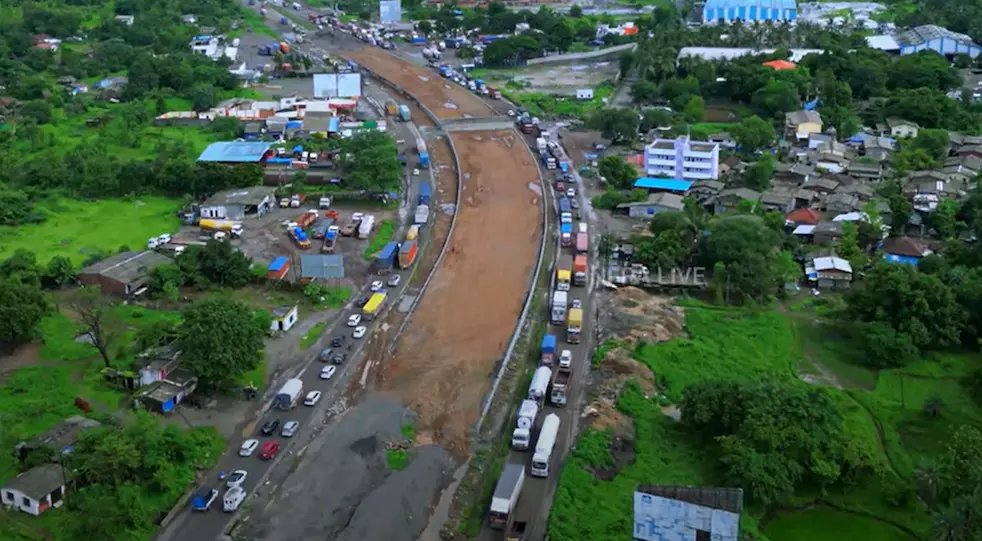
As Valsad DM Bhavya Verma cracks down on NHAI over deadly potholes, the spotlight turns to Union Minister Nitin Gadkari’s highway promises
Valsad’s Highway Dream Horror, A Death Trap in Disguise
The Ahmedabad-Mumbai National Highway 48, a vital commercial artery, has turned into a nightmare for commuters. Monsoon rains have exposed gaping potholes, triggering a surge in fatal accidents. In a rare show of administrative grit, Valsad District Magistrate Bhavya Verma invoked Section 163 of the Bharatiya Nagarik Suraksha Sanhita (BNSS) 2023, issuing a 10-day ultimatum to the National Highways Authority of India (NHAI) to repair the craters or face criminal charges.
Table of Contents
On the rain-battered stretch of NH-48, what was once a national lifeline has now earned the ominous moniker: “Death Highway.” Craters yawning across lanes, eroded service roads, and a chilling rise in accident deaths have left locals furious and grieving.
“This highway has literally become hell for commuters,” said a local resident, echoing the district’s collective frustration.
“This isn’t just negligence, it’s murder in slow motion,” said a bereaved resident, whose relative was killed in a recent crash.
The DM’s order isn’t just bureaucratic, it’s a desperate cry for accountability. If repairs aren’t completed and another accident occurs, the responsible agency will face charges under Sections 106 and 223 of BNSS 2023. This includes the dilapidated service roads, which have also become accident hotspots. This move could set a national precedent: where poor infrastructure meets punitive action, not just outrage.
The move has sparked hope among residents, many of whom have lost loved ones to the treacherous stretch. But it also raises a pressing question: How did India’s “world-class” highway dream come to this?
Gadkari’s Grand Vision vs Ground Reality
Union Minister Nitin Gadkari has long been hailed as the architect of India’s highway revolution. From record-breaking construction speeds to ambitious expressway projects, his vision has been clear: match American highway standards within two years. But when potholes become death traps, the message doesn’t match the medium.
“If the issue is on my road, I won’t spare the contractor or the officer,” Gadkari declared recently, responding to public outrage over collapsing roads.
In contrast to his TED-style projections, on-ground horror stories from Valsad, Amritsar–Jamnagar, and other corridors offer a stark reality check. While disciplinary actions and crackdowns have begun, questions on execution, quality monitoring, and fund transparency remain unanswered.
Despite his commitment to quality and safety, recent incidents, including the NH-48 disaster, have cast a shadow over these claims. Gadkari admitted that while he oversees 1.5 lakh km of national highways, accountability must be enforced when failures occur.
His reaction to the Valsad crisis has been measured but firm. He emphasized that fraudulent contractors will be punished, and disciplinary action has already been taken in similar cases, such as the Amritsar–Jamnagar Economic Corridor, where poor materials and drainage led to pavement failures.
Yet, critics argue that boasting about world-class infrastructure while citizens die on neglected roads is a dangerous contradiction. Gadkari’s favorite meme—“Nikla Gadi Leke, Toll Aaya Samne”—may be witty, but for Valsad’s grieving families, it’s no joke.
Can India Rebuild Trust in Its Roads?
The Valsad episode is more than a local tragedy, it’s a litmus test for India’s infrastructure governance. With over ₹2 lakh crore worth of highway projects underway, the stakes are high. Gadkari’s roadmap includes green corridors, reduced logistics costs, and enhanced connectivity to religious and tourist sites.
India’s infrastructure leap is undeniable. Expressways like the Delhi–Mumbai Corridor and Bharatmala project are marvels in motion. But Valsad shows that speed without safety is a recipe for disaster.
The new BNSS law might be the torch India needs to light its way through the cracks in governance. If DM Verma’s stand gains traction, it could redefine:
- Legal recourse for infrastructure negligence
- Public transparency in road maintenance
- Real-time civic grievance systems
- Technocratic accountability in highway projects
Trust is built on results, not declarations. And as NH-48’s battered surface draws national attention, India must move from slogans to safety-first infrastructure culture.
Stay updated with the latest news on Rapido Updates. Keep yourself updated with The World, India News, Entertainment, Market, Automobile, Gadgets, Sports, and many more